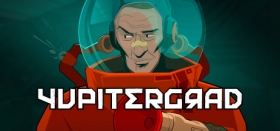
Yupitergrad Review
Yupitergrad is a short and sweet VR puzzle platformer which offers a healthy dose of winching, swinging, swimming, and exploring. The game tells a simple story, taking place aboard a Russian space station hovering in Jupiter’s atmosphere. The game is peppered with plenty of tongue-in-cheek Slavic humour, accessible to broader audiences as well as tried-and-true Slavs (yours truly). Yupitergrad is the only VR title I have experienced which made me feel like Spider-Man swinging around the streets of New York. Despite being a Russian cosmonaut aboard a space station.
Yupitergrad’s premise is simple. You are a recently recruited kosmonaut kandidate (not a typo, every ‘c’ in this game is a ‘k’). You have been tasked with travelling to Russia’s Jupiter base, Yupitergrad. Upon arrival, you will find yourself doing odd jobs like repairing fans and pumps so that you can refine Pekol – an alternative fuel source comprised of Jupiter’s gases. Players can expect to finish Yupitergrad in a short two to three hours.
Players shouldn’t expect an extremely detailed and refined story when playing Yupitergrad. In its short runtime, players will mostly find themselves being told where to go to achieve their end goal of refining Pekol, and that’s about it. Think of Portal’s GLaDOS AI humorously guiding you through levels, except the humour is Slavic and more dad-jokey than witty. With that, you’ve got a good enough understanding of what to expect from Yupitergrad’s narrative. It’s nothing to write home about, which I was completely okay with as the real star of the show is Yupitergrad’s gameplay.

The game shines brightest in its swinging, catapulting and vaulting mayhem.
Traversing Yupitergrad’s world is a whole lot of fun once you’ve acquainted yourself with the mostly straightforward controls. You point one or both of your controllers at any blue surface, pull the trigger, and winch yourself towards your goal either by generating momentum with your arms or making finer adjustments to the winch with your thumbsticks. Your bumpers control propellers which are used to navigate the areas of the game which are underwater; however, they can also come into play to generate a little extra momentum when you are mid-air. Finally, you can adjust your camera with your thumbsticks if you are entirely untethered. Personally, I opted to play seated and swivel around in my chair and didn’t find myself controlling the camera this way.
The aforementioned mechanics form some extremely satisfying momentum-driven traversal and problem-solving, reminiscent again of Portal. Players will find themselves navigating spiky death traps, fans, and pipes, launching themselves over abysses and ledges, and swinging from point to point over perilous drops. I can barely fault Yupitergrad’s gameplay – it feels fantastic. If a Spider-Man VR title ever comes to fruition, get developer Gamedust involved. In theory, I would expect a whole lot of motion sickness issues with a fast-moving game like Yupitergrad. Still, thanks to some form of sorcery pulled off by the developers or my resilient stomach, such symptoms were seemingly non-existent.
The one criticism I have for the core winching gameplay is the targeting. I found myself having some difficulty attaching to distant surfaces or even pressing buttons within reach of me, often needing a few attempts to stick the rope. I feel the addition of either crosshairs, or better yet, a hint of aim assist would almost certainly resolve this issue.

The cel-shaded environments are nice enough, but a little more detail and variety would have been nice.
Yupitergrad’s environments are cel-shaded, which is a perfectly acceptable design choice paired with the silly humour of the game’s story. Nonetheless, the levels throughout the game are a little bit bland. Outside of the four colours of blue (surfaces to attach to), grey (normal surfaces), red (areas to avoid) and yellow (objects you can interact with), there isn’t much variety to the Yupitergrad station to be seen. Again, I see this as only a small issue, as Yupitergrad’s gameplay more than makes up for the lack of environmental variety – particularly in a game that’s this short.
Yupitergrad (Reviewed on Oculus Quest)
This game is good, with a few negatives.
Yupitergrad serves as a proof of concept that you can have a fast-moving vertical platforming experience in the VR medium. Swinging and propelling your way around a massive space station completely fulfils a power fantasy that many adopters of VR have undoubtedly been seeking.









COMMENTS